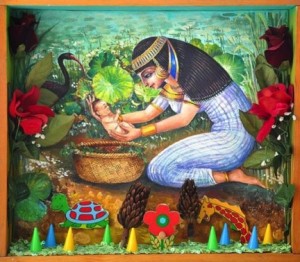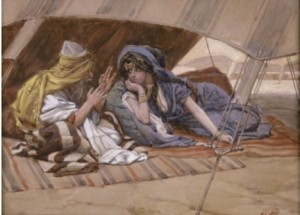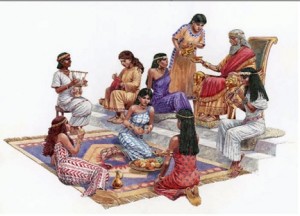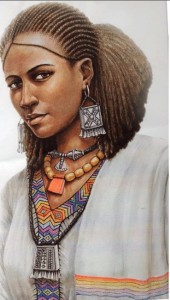Once Moses’ mother, Jocheved, paradoxically obeyed Pharaoh and “threw” her son in the Nile, Pharaoh’s daughter discovered the baby. Moses’ sister followed the basket and offered the king’s daughter suggestions on how to care for the child. Daughters are prominent in this part of the story, the word occurring six times. “Certainly our attention is being drawn to the ironic connection between Pharaoh’s intent to spare the daughters and the fact that a succession of daughters, the last being his own, contributes to his undoing” (Ackerman, p.95). Overall women dominate the first chapters of Exodus prompting us to wonder about the significance of women in ancient Israelite storytelling. “The question is not why does a story of daughters form the prelude to the exodus, but rather: what effect do these stories about women have on the way we read the exodus story as a whole?” (Exum, p. 60). In particular, I want to explore the way in which the king of Egypt’s own daughter determined the outcome of the story of the exodus. Continue reading Pharaoh’s Daughter
Tag Archives: princess
The House of Sarah
The Bible both prizes Sarah and disparages her. Her high valuation is reflected by the following events:
- In Egypt, Abraham does not order Sarah but pleads for her to pretend she is his sister;
- Sarah demands that Abraham impregnate Hagar for the benefit of building up Sarah;
- Abraham complies with Sarah’s demand for the expulsion of Hagar and Ishmael;
- God tells Abraham to listen to Sarah;
- Sarah’s name was changed from Sarai, just as Abraham’s was from Abram, with the accompanying promise that “she shall give rise to nations; kings of peoples shall come from her” (17:16) – in other words the covenant blessings and promises apply to her (Evans);
- a whole chapter is devoted to Sarah’s burial.
In addition, the rabbinical tradition was eager to see Sarah as a prophetess whose spirit of prophecy was even greater than Abraham’s!
Solomon’s Egyptian Wife
Deut. 17:15 -17 admonishes the people of Israel to not let their king, probably Solomon, have lots of wives. Since the patriarchs and King David were polygamists, this critique of King Solomon seems unwarranted at first reading. As I explored all the references to Solomon’s wives and concubines I found varied and contradictory assessments of the king, from expressions of national pride to severe condemnation, particularly for his marriage to Pharaoh’s daughter. Since Pharaoh’s daughter is the first mentioned in the list of Solomon’s wives in 1 Kings 11:1, she came to symbolize Solomon’s harem as a whole (Reinhartz, Why, p.25). Continue reading Solomon’s Egyptian Wife
White as Snow, Black as Cush
“…Miriam and Aaron spoke against Moses because of the Cushite woman he married: ‘He married a Cushite woman!’ They said, ‘Has the Lord spoken only through Moses? Has He not spoken through us as well?” Numbers 12:1-2
This scene begs us to ask, “Who was this Cushite woman? And what does Moses’ marriage to her have to do with his siblings’ concern about prophetic authority?” The answer to who this woman was will help us understand what part she played in the struggle between the siblings and therefore will provide us with a better understanding of the point of the story. Continue reading White as Snow, Black as Cush




